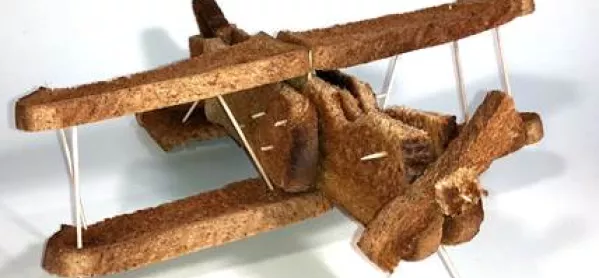Today in their history lesson, the children in Kate Heap’s Year 6 class are doing something unusual: using slices of toast to build First World War fighter planes. The toast planes are complete with propellers and look ready to take part in a breakfast dogfight at any moment.
This activity might sound like a gimmick, but it is all part of an initiative run by community interest company Big Ideas, which aims to mark the centenary of the end of the First World War through projects that involve children engaging with local and personal stories.
At Farsley Farfield Primary School in Pudsey, West Yorkshire, that means learning about history which lies literally just outside the window.
“The school is situated right by the site of a World War I airfield. When we were working together to make our planes, we could look out and imagine the real planes landing and taking off right there,” says Heap.
The initiative is all about projects that will stick with the students, says Virginia Crompton, chief executive of Big Ideas - hence the toast planes.
“We wanted accessible materials that are cheap, easy to get hold of and easily manipulated by little hands,” she explains. “We also wanted something memorable and highly creative so that the experience stays with the children. We liked the idea that they might think of the planes each time they have a slice of toast.”
Delving into local history
The Remember RAF100 project focuses on teaching about the memorialisation of the Royal Flying Corps’ involvement in First World War. As well as building model planes, pupils at the school have been assigned their own real First World War pilot to research. They have been taking pride in learning the stories of “their” pilot, while also getting to understand more about the local implications of history, and consolidating learning between year groups.
“Year 6 pupils helped Year 2 pupils learn about remembrance and commemoration, as they were able to personally pass on the individual soldiers’ stories which they had learned,” says Heap. “Only through carrying on this oral history can pupils really understand this history and continue passing down the soldiers’ stories.”
In addition, the local aspect of the project offered an opportunity for pupils to connect with older members of the community. They attended a memorial service in the local church and met serving members of the RAF in a special event in the school. Heap says that pupils were excited to join the dots between the historical figures they had learned about and contemporary members of the armed forces.
‘Untold stories’
Big Ideas is running two other projects alongside Remember RAF100 which focus on the untold and lesser-known stories of the First World War.
The Trailblazers project centres around teaching about the women of the First World War, particularly lesser-known stories of inspirational figures, such as disabled suffragette Rosa May Billinghurst.
Tull100 commemorates Walter Tull, the first man of black heritage to become an officer in the British army. This project encourages students to look at inclusivity in their schools, youth groups and football clubs.
Both projects will, Crompton hopes, change the way that children view history as a school subject.
“I don’t believe in history for history’s sake,” she says. “History should encourage you to see things differently, following in the footsteps of those who were courageous enough to take the first step.”
Elliot Douglas is a student at the University of St Andrews
To find out more about Remember RAF100, Trailblazers and Tull100, please visit www.big-ideas.org
To request free resources or to apply for small-scale project funding, email RAF100@big-ideas.org, tull100@big-ideas.org or trailblazers@big-ideas.org





